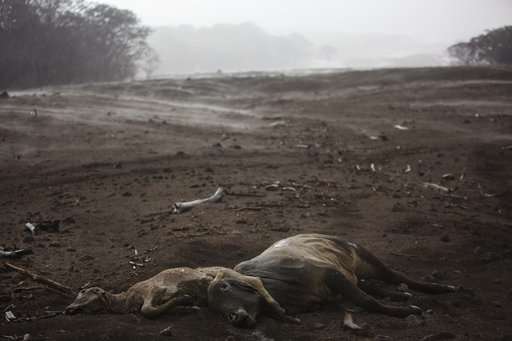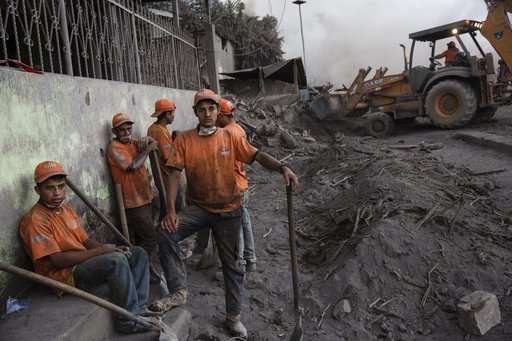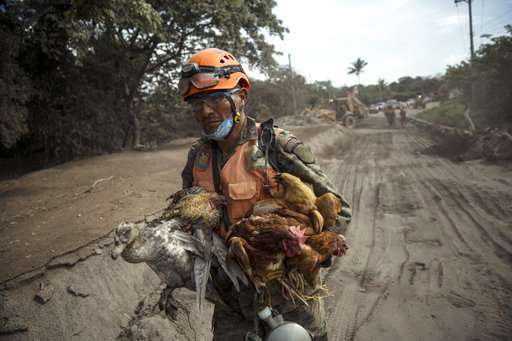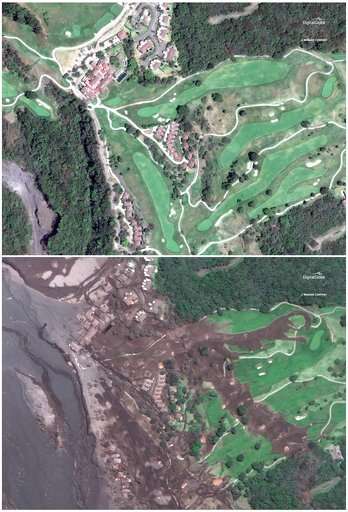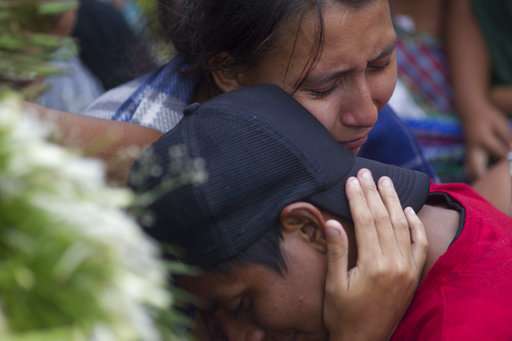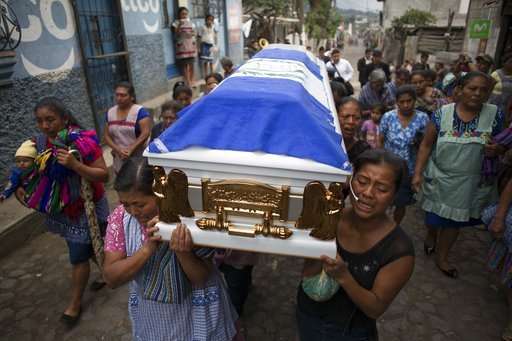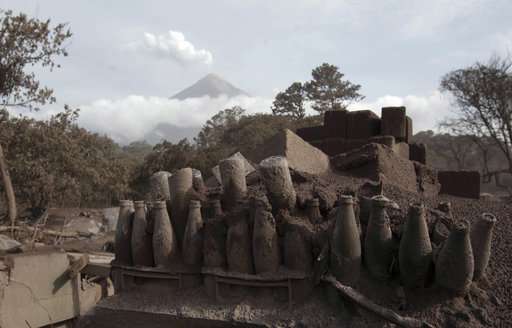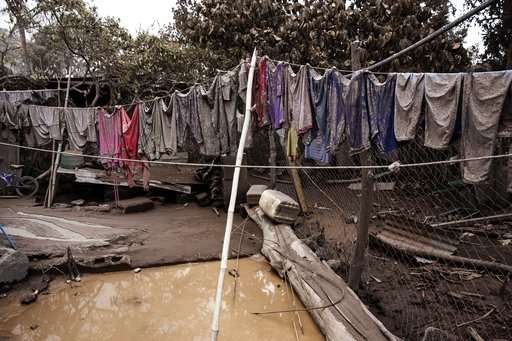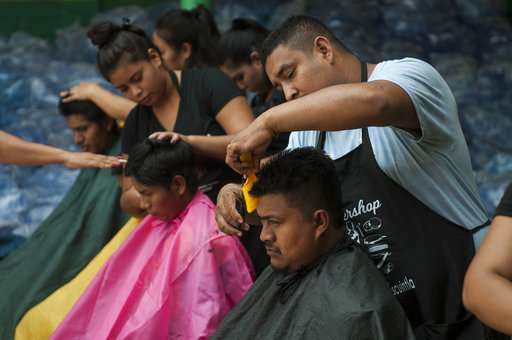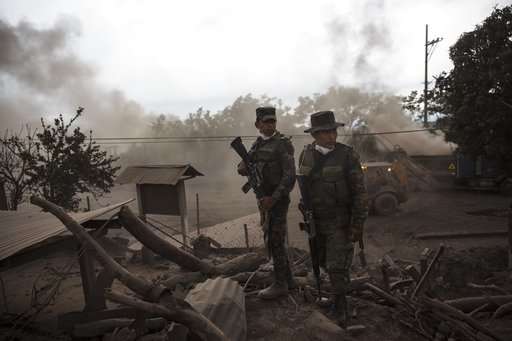Cows lie dead amid steam rising from the hot volcanic ash following a light rain, near the Volcan de Fuego, or "Volcano of Fire," in the El Rodeo hamlet of Escuintla, Guatemala, Wednesday, June 6, 2018. Firefighters said the chance of finding anyone alive amid the still-steaming terrain was practically nonexistent 72 hours after Sunday's volcanic explosion. (AP Photo/Rodrigo Abd)
Guatemala's national disaster agency on Thursday suspended search and rescue efforts at the zone devastated by the eruption of the Volcano of Fire, saying climatic conditions and still-hot volcanic material makes it dangerous for the rescuers.
It said it decided to suspend the search now that 72 hours have passed. That's the length of time officials had said earlier that some victims might have survived.
Troublesome rain and more volcanic activity had been hindering search searches, but when teams have been able to work in the hardest hit areas, the death toll has continued to rise.
Efforts were cut short again Wednesday when a downpour forced teams to retreat for fear of mudslides. Boiling water flowing down the volcano's slopes from dangerously hot volcanic gas and ash also posed a threat. A day earlier, flows of super-heated volcanic material forced crews to pull back.
But between stoppages, search teams working with shovels and heavy equipment found more bodies from Sunday's big eruption. Remains were loaded into body bags and carried out on stretchers.
Guatemala's National Institute of Forensic Sciences raised the death toll to 99 late in afternoon, an increase of 24 bodies for the day. Only 28 of the total had been identified. At least 197 people were listed as missing.
Rescue workers gather in the disaster zone covered in volcanic ash near the Volcan de Fuego, or "Volcano of Fire, in the El Rodeo hamlet of Escuintla, Guatemala, Wednesday, June 6, 2018. Firefighters said the chance of finding anyone alive amid the still-steaming terrain was practically nonexistent 72 hours after Sunday's volcanic explosion. (AP Photo/Rodrigo Abd)
"Nobody is going to be able to get them out or say how many are buried here," Efrain Suarez said, standing amid the smoking holes dotting what used to be the village of San Miguel Los Lotes on the flanks of the mountain.
"The bodies are already charred," the 59-year-old truck driver said. "And if heavy machinery comes in they will be torn apart."
Rescuers poked metal rods into the ground, sending clouds of smoke pouring into the air in a sign of the super-hot temperatures still remaining below the surface, which firefighters said reached as high as 750 to 1,300 degrees Fahrenheit (400 to 700 degrees Celsius) in some places.
A day after a new evacuation was ordered due to increasing activity by the volcano, a red alert remained in place for the departments of Escuintla, Sacatepequez and Chimaltenango, and people were advised not to linger near the affected zones.
A rescue worker carries a flock of farm birds rescued from homes destroyed by the Volcan de Fuego, or "Volcano of Fire," eruption, in El Rodeo, Guatemala, Wednesday, June 6, 2018. Rescuers were concerned about possible dangers posed not only by more volcanic flows but also rain. Authorities have said the window is closing on the chances of finding anyone else alive in the devastation. (AP Photo/Rodrigo Abd)
The country's seismology and volcanology institute warned of new flows descending through canyons on the volcano's western slope toward the Pantaleon River, carrying boulders and tree trunks.
At a shelter in the Murray D. Lincoln school in the city of Escuintla, about 10 miles (15 kilometers) from the volcano's peak, Alfonso Castillo said he and his extended family of 30 had lived on a shared plot in San Miguel Los Lotes where each family had its own home.
The volcano is one of Central America's most active, and everyone was accustomed to rumbling and spewing smoke, so at first nothing seemed unusual Sunday, the 33-year-old farm worker said. But then a huge cloud of ash came pouring out.
"In a matter of three or four minutes the village disappeared," Castillo said. It was smothered in what he described as a "sea" of muck that came crashing into homes, inundating people, pets and wildlife.
This combo of two satellite images provided by Digital Globe shows La Reunion Golf Resort pictured on April 7, 2017, top, and the same area encased in volcanic ash on June 6, 2018, three days after the eruption of the Volcan de Fuego, which means in English "Volcano of Fire," at the base of the volcano in Escuintla, Guatemala. (Satellite Image ©2018 DigitalGlobe, a Maxar company via AP)
The family holed up in a house that heated up "like a boiler" inside, he said, then made their way onto the roof and then to the upper story of another, concrete home. After a cellphone call to Castillo's brother, rescuers arrived and took the family to safety.
But the life they knew was gone.
"Nobody wants to go back there. My children say they would rather be in the streets. ... There are many people who are helping us, but we have absolutely nothing. We could not get anything out," Castillo said. "For us, there is no tomorrow."
In past disasters in which authorities determined there was no chance of finding survivors and further efforts to recover bodies would be too difficult, areas have been declared burial sites, the final resting place of the victims.
Asked about that possibility, the director of Guatemala's disaster agency, Sergio Cabanas, said: "Not until the search efforts are over, and it would be left up to the people."
-
Kimberly Sofia Gonzalez consoles her husband Milton Rivas during the burial of his brother Erick Rivas, 20, who died in the hospital after suffering burns from the eruption of the Volcan de Fuego, which in Spanish means Volcano of Fire, at the cemetery in San Juan Alotenango, Guatemala, Wednesday, June 6, 2018. On the day of the eruption, Sunday, Erick Rivas was returning home from the town of San Miguel Los Lotes after visiting his girlfriend, who survived. (AP Photo/Luis Soto)
-
Female family members of Erick Rivas, 20, who died in the hospital after suffering burns from the eruption of the Volcan de Fuego, which in Spanish means Volcano of Fire, carry his remains to the Catholic church to bury him in San Juan Alotenango, Guatemala, Wednesday, June 6, 2018. On the day of the eruption, Sunday, Rivas was returning home from the town of San Miguel Los Lotes after visiting his girlfriend, who survived. (AP Photo/Luis Soto)
-
Crates of soda pop bottles stored on the rooftop of a home are blanketed with volcanic ash while the Volcan de Fuego, or "Volcano of Fire," blows out a plume of smoke and ash, in Escuintla, Guatemala, Wednesday, June 6, 2018. Rescuers were concerned about possible dangers posed not only by more volcanic flows but also rain. Authorities have said the window is closing on the chances of finding anyone else alive in the devastation. (AP Photo/Moises Castillo)
-
Apparel hung on a clothesline are covered in volcanic ash outside a home in the disaster zone near the Volcan de Fuego, or "Volcano of Fire, in the El Rodeo hamlet of Escuintla, Guatemala, Wednesday, June 6, 2018. Firefighters said the chance of finding anyone alive amid the still-steaming terrain was practically nonexistent 72 hours after Sunday's volcanic explosion. (AP Photo/Rodrigo Abd)
-
A displaced woman sits still as a student stylist trims her hair that was singed during the powerful Volcan del Fuego or Volcano of Fire eruption, at a shelter near Escuintla, Guatemala, Wednesday, June 6, 2018. On an open-air patio at Murray D. Lincoln school, several displaced people sat on plastic chairs covered by aprons as the volunteers attended to them Wednesday. (AP Photo/Oliver de Ros)
-
Student stylists trim the singed hair of residents who were burned during the powerful Volcan del Fuego or Volcano of Fire eruption, at a shelter near Escuintla, Guatemala, Wednesday, June 6, 2018. On an open-air patio at Murray D. Lincoln school, several displaced people sat on plastic chairs covered by aprons as the volunteers attended to them. (AP Photo/Oliver de Ros)
-
Soldiers stand guard outside a destroyed home in the disaster zone covered in volcanic ash near the Volcan de Fuego, or "Volcano of Fire, in the El Rodeo hamlet of Escuintla, Guatemala, Wednesday, June 6, 2018. Firefighters said the chance of finding anyone alive amid the still-steaming terrain was practically nonexistent 72 hours after Sunday's volcanic explosion. (AP Photo/Rodrigo Abd)
© 2018 The Associated Press. All rights reserved.
